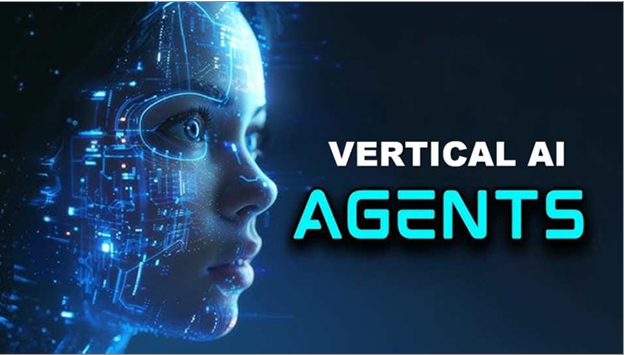In today’s competitive market, businesses are increasingly turning to AI-driven solutions to streamline operations, reduce human error, and deliver faster outcomes. While general-purpose AI tools offer some flexibility, vertical AI agents—purpose-built for specific industries—are emerging as game changers for achieving precision, compliance, and speed in sector-specific tasks.
In this article, we explore how domain-specific AI agents are transforming enterprise workflows, their practical applications across industries, and how businesses can leverage them for a sustainable competitive edge.
What Are Vertical AI Agents?
Vertical AI agents are artificial intelligence systems designed to handle tasks unique to a specific industry or business function. Unlike general AI models, which are broad and multipurpose, vertical agents are tailored to understand the language, regulations, workflows, and data types within a particular sector.
They enable organizations to deploy intelligent automation with minimal customization, resulting in faster go-live times and more accurate outcomes.
To explore some of the most powerful vertical AI agents, check out this industry-focused AI platform that showcases real-world examples across legal, finance, healthcare, and e-commerce sectors.
Key Advantages of Vertical AI Agents
1. Deep Domain Knowledge
These agents are trained on curated datasets relevant to specific industries—such as contracts for legal teams, compliance checklists for finance, or electronic health records for healthcare providers. This deep understanding enables them to deliver high-accuracy outputs with less need for manual oversight.
2. Faster Deployment
Because vertical agents are pre-configured for certain domains, implementation time is significantly reduced. Businesses no longer need to spend months training a generic AI model to understand domain-specific tasks.
3. Higher ROI
With improved accuracy and efficiency, vertical agents help businesses cut down on operational costs, reduce compliance risks, and improve turnaround times. This translates into a higher return on investment over time.
Common Use Cases Across Industries
Legal: Contract Clause Validation
Legal teams often spend countless hours reviewing contracts for risk clauses, compliance statements, and missing elements. A vertical AI agent built for legal operations can automatically extract key terms, compare them against company policies, and flag non-compliant clauses.
Finance: Invoice and Payment Reconciliation
In finance, AI agents can automate tedious processes like invoice matching, fraud detection, and financial reconciliation—freeing up human analysts to focus on strategic tasks.
Healthcare: Clinical Summarization
AI agents in the healthcare domain can analyze physician notes, lab results, and discharge summaries to generate concise reports that assist in clinical decision-making.
E-commerce: Order Fulfillment Optimization
AI agents trained on retail and logistics data can streamline order management, predict shipping delays, and dynamically adjust inventory—all in real-time.
Building Custom AI Agents for Your Business
While pre-built vertical agents are ideal for common workflows, businesses with unique processes often need custom AI agents that align with their specific needs. These agents can be tailored to handle bespoke data types, workflows, or compliance requirements.
Explore how to create, manage, and deploy your own tailored agents using this AI agent creation platform designed to support custom configurations and modular integration into existing business systems.
How to Choose the Right AI Agent for Your Workflow
Step 1: Identify High-Impact Use Cases
Start by identifying the workflows that are repetitive, time-consuming, and prone to errors. These are prime candidates for automation using vertical or custom AI agents.
Step 2: Evaluate Available Agents
Determine whether there is an existing vertical agent that fits your use case. Many providers offer demo versions or sandbox environments for evaluation.
Step 3: Consider Customization Needs
If your processes require unique logic or data structures, a customizable platform may be more suitable than a pre-built vertical solution.
Step 4: Focus on Integration
Make sure the AI agent can integrate seamlessly with your current systems (ERP, CRM, or document management tools). This ensures smooth data flow and minimal disruption to existing workflows.
The Future of Domain-Specific AI
As AI continues to evolve, vertical agents are expected to become even more intelligent—learning from user feedback, adapting to regulatory changes, and integrating with other intelligent systems like knowledge graphs or real-time analytics engines. This will further amplify their value across industries.
In the next decade, we may see the rise of interoperable AI agents that collaborate across domains—for example, a healthcare billing agent communicating directly with an insurance validation agent—offering an even more connected and autonomous enterprise landscape.
Final Thoughts
Businesses can no longer afford to ignore the power of AI—but it’s no longer about just “using AI.” It’s about using the right AI for the job. Vertical and custom AI agents offer a powerful way to achieve targeted automation, reduce costs, and accelerate digital transformation.
If your organization is ready to unlock the next level of AI-driven efficiency, explore how ZBrain’s platform can guide your journey with both ready-to-deploy vertical solutions and flexible custom agent frameworks.



